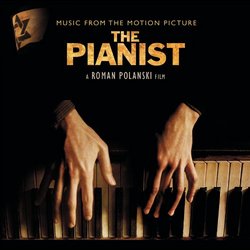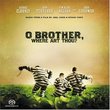| All Artists: Janusz Olejniczak, Frederic Chopin Title: The Pianist: Music from the Motion Picture Members Wishing: 0 Total Copies: 4 Label: Sony Original Release Date: 1/3/2003 Re-Release Date: 11/26/2002 Album Type: Soundtrack Genre: Soundtracks Style: Number of Discs: 1 SwapaCD Credits: 1 UPC: 696998773929 |
Search - Janusz Olejniczak, Frederic Chopin :: The Pianist: Music from the Motion Picture
 | Janusz Olejniczak, Frederic Chopin The Pianist: Music from the Motion Picture Genre: Soundtracks
Roman Polanski's telling of famed Polish composer-pianist Wladyslaw Szpilman's survival in the Nazi-controlled Warsaw ghetto can't help but be infused with the director's deepest passions: he himself escaped the Krakó... more » ![header=[] body=[This CD is available to be requested as disc only.]](/images/attributes/disc.png?v=15401716) ![header=[] body=[This CD is available to be requested with the disc and back insert.]](/images/attributes/disc_back.png?v=15401716) ![header=[] body=[This CD is available to be requested with the disc and front insert.]](/images/attributes/disc_front.png?v=15401716) ![header=[] body=[This CD is available to be requested with the disc, front and back inserts.]](/images/attributes/disc_front_back.png?v=15401716) |
Larger Image |
CD DetailsSynopsis
Amazon.com Roman Polanski's telling of famed Polish composer-pianist Wladyslaw Szpilman's survival in the Nazi-controlled Warsaw ghetto can't help but be infused with the director's deepest passions: he himself escaped the Kraków ghetto as a boy of 7. The musician's status as a musical hero to the oppressed Polish Jews of World War II was surpassed only by that of Chopin, the composer who was at the core of Szpilman's repertoire. Thus this score revolves tightly around Chopin's music, with modern Polish pianist Janusz Olejniczak paying passionate homage to both his musical and national forebears, the haunting strains of the Nocturne in C-sharp Minor setting the film's historical and dramatic tone. The underscore of previous Polanski collaborator Wojciech Kilar (The Ninth Gate, Death and the Maiden) is represented here by the soulful "Moving to the Ghetto," a cue that helps anchor the soundtrack's troubling time and place with understated grace. The collection concludes with a rare, remastered performance of Chopin's Mazurka Op. 17, No.4 by Szpilman himself, recorded in Warsaw in 1948. --Jerry McCulley Similar CDsSimilarly Requested CDs
|
CD ReviewsMarvellous! G. Shkodra | Montreal, Canada | 02/10/2006 (5 out of 5 stars) "While being very familiar with the Holocaust and F. Chopin's work, I have to admit I had no idea who Wladyslaw Szpilman was. After watching Polanski's masterpiece of a movie, I'm glad that I got to know the life of a man who went through hell and managed to survive thanks to the courage and strength given to him by Chopin's music that he constantly played in his head under surreal circumstances. "The Pianist" music soundtrack is a wonderful collection of Chopin's piano works. Of course a few masterpieces of the polish great composer have been left out, but I think that's more than understable. After all, Polanski needed certain pieces that connected best with some of the images and scenes of his movie. And in the end we all agree that he certainly pulled it off. Before watching the movie, I didn't know who Janusz Olejniczak was either. Now I do. His Chopin is really marvellous, especially the "Nocturne in C-sharp Minor", "La grande Polonaise brillante" and "Nocturne in E Minor Op. 72 No 1". Getting to know Olejniczak's Chopin is yet another reason to be thankful to Polanski." A Masterpiece Ballerina | 10/10/2007 (5 out of 5 stars) "This US version of the original movie soundtrack of Polanski's "The Pianist" which portrays Wladyslaw Szpilman's will to survive against the evil of holocaust through his music. Whilst the music of Chopin and others makes an excellent score for the mood of the movie (Janusz Olejniczak plays superbly on the piano), one is left in stunned silence throughout at the injustice and horror that could ever have happened to humankind and tears will only start rolling when the movie ends on the triumphant note of Grand Polonaise brillante preceded by an Andante spianato Op.22 jolting you out of your helpless anguish to applaud in standing ovation with the audience on screen. Get this CD, enjoy the exquisite music and relive the poignant scenes. You won't regret it. " Why 'Moving to the Ghetto' is essential to include Larkenfield | 03/29/2008 (5 out of 5 stars) "I believe that without the inclusion of Moving to the Ghetto, this would mostly be a beautiful collection of fine but isolated Chopin performances and not a soundtrack. Moving to the Getto reminds listeners to hear the performances of these gorgeous works within the context of the horrors of the times -- making for a completely different take on Chopin -- and this track is indispensable to have these individual pieces hang together as a meaningful whole. Ghetto is subtly and tactfully done, and I feel the producers made the right decision to include it. It's heartbreaking to think of such beauty being played amid the setting of such brutal and inhuman squalor. Psychologist Michael Frankl wrote "Man's Search for Meaning" after surviving his own ordeal under the Nazi madness, and his book tells a great deal why some people survived - those who had any chance at all - and those who didn't. It's amazing that man can sink so low and yet when spiritually attuned, can soar to the heights."
|

 Track Listings (12) - Disc #1
Track Listings (12) - Disc #1









